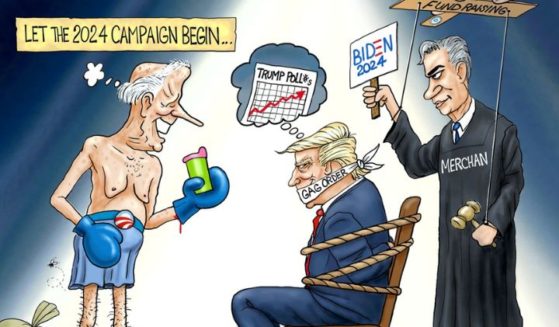Fact Check: Media's Claim That Trump Caused Higher Rate of Poison Control Calls Is Fake News
President Donald Trump’s recommendation of chloroquine as a potential treatment for COVID-19 is still colored, as far as the media is concerned, because a couple decided drinking aquarium cleaner with an ingredient that sounded very similar to the drug was indeed a substitute for the actual drug.
They were wrong and, tragically, one of them ended up dying.
When the president suggested (yes, sarcastically, no matter what you want to say) that disinfectant could be used to kill the coronavirus, a whole lot of heck broke loose. It was irresponsible, the media said. But to prove it was irresponsible, the media also had to prove that someone actually acted on this ludicrous information by imbibing poison at Trump’s suggestion.
Thankfully, this wasn’t to difficult for Trump critics to believe. Sure, they knew enough to not inject bleach, but the proles will do anything that Trump says, and we have to look out for them. Evidence? Oh yeah, there’s a higher rate of poison control calls!
NYC Poison Control Calls for Bleach, Lysol Double After Trump Disinfectant Comment https://t.co/wlO4Bs8gq5
— Glenn Kirschner (@glennkirschner2) April 25, 2020
Citing a “significant increase” in calls to the Illinois Poison Control Center, Illinois Department of Public Health Director Dr. Ngozi Ezike is urging state residents not to ingest cleaning chemicals as a treatment for coronavirus. https://t.co/nJOBNGBeLH
— Kyle Griffin (@kylegriffin1) April 26, 2020
BREAKING: President Trump said he claims no responsibility for the spike in calls to poison control centers after he suggested last week that ingesting disinfectants could be used as a coronavirus cure https://t.co/yTfftPRUlI
— The Daily Beast (@thedailybeast) April 27, 2020
See — proof! #Science! Disagree with that, Trumpbots.
The problem with the #science people is that actual science beats hashtag-science, assuming someone bothers to get to it. Over at Reason, senior editor Elizabeth Nolan Brown did. It turns out there’s no proof Trump’s Lysol moment had anything to do with an increase in calls to poison control.
Reason, it should be pointed out, is a libertarian mag with little love toward the current president. Trust me — if our country’s most powerful politician made a comment that people should consider injecting poison into their veins and they did it, Reason would enjoy little more than skewering him.
But the evidence — remember that stuff? — did not lead in that direction. Yes, calls to poison control are up. The problem for the media, Brown reported, is that calls to poison control have been up since March, when things involving the coronavirus got very real.
Brown took one example of the phenomenon, a New York Daily News article titled “A spike in New Yorkers ingesting household cleaners following Trump’s controversial coronavirus comments.”
“But the article makes no mention of anyone deliberately consuming household cleaners. It simply states that 30 people called the city’s poison control hotline ‘over fears that they had ingested bleach or other household cleaners,'” Brown reported. “Fearing that you ingested something doesn’t jibe with having intentionally consumed that substance.
“The authors of the Daily News piece, Anna Sanders and Chris Sommerfeldt, try to circumvent this inconvenient fact by noting that over the same time period in 2019, the Poison Control Center ‘only handled 13 similar cases.’ And while this time, nine calls were about possible Lysol exposure and 10 about bleach, last year’s calls contained ‘no cases reported about Lysol exposure and only two were specifically in regards to bleach.'”
Perhaps most importantly, none of the people who called poison control required hospitalization or died. Generally speaking, injecting or imbibing bleach will end in those circumstances, so we can safely say none of this happened. And yes, many of these calls involved household disinfectants. Can you think of one cleaning item we’ve been using more of since last year? It’s slipping my mind.
Another story from WDRB.com out of Kentucky also made the rounds.
“Poison control centers around the country, including here in Kentucky, are seeing a spike in calls related to COVID-19,” the story stated, quoting a director of the Kentucky Poison Control Center who said that “just in March, we saw about a 30% increase in hand sanitizer exposures and about a 50% increase in household cleaners.”
You may perhaps see the problem there: Trump made his remarks in April.
There were other articles that chronicled “a nine percent increase in calls for accidental poisoning from home cleaning supplies” from Michigan in March and “calls for toxic exposure to hand sanitizers have nearly doubled since the same time in 2018,” over the past six weeks in Maryland.
“In addition, the MD Control Center has had 95 calls for bleach exposure, more than double last year’s 46 calls in the same time period,” WBBF in Baltimore reported.
The time period suggests this had nothing to do with the “Lysol remarks.” (Trump, it must be noted, never used the brand-name “Lysol,” but there’s also ample evidence Jim Jones used an off-brand of sugar-water called Flavor Aid to mix his cocktail of death down in Jonestown and we don’t call it “drinking the Flavor Aid,” so we’re going to guess Trump’ll be saddled with that Lysol thing forever.)
However, that’s not going to sell your editor on what’s essentially just a boring story compiling statistics from the state poison control center, so this is all about the Lysol remarks. But don’t call this fake news, because these reporters are the fearless truth-tellers we need at a moment like this.
And yet, for publications so allegedly devoted to fact-checking, this is what they ended up with. Calls to poison control centers are up at a time of great cultural stress, when cleaning products like Lysol and bleach have become part of daily lives. The president made a sarcastic remark about injecting or imbibing disinfectant. Is there something to connect the two together? No?
To paraphrase William Randolph Hearst, you furnish the connection, they’ll furnish the outrage.
Truth and Accuracy
We are committed to truth and accuracy in all of our journalism. Read our editorial standards.












